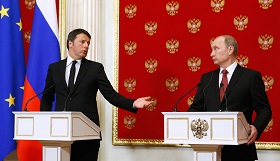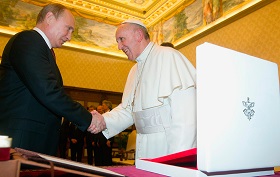Following its six-month presidency of the EU (in the second half of 2014), Italy is becoming an international venue for half a year for discussions of various global issues, primarily those concerning food topics – the EXPO 2015 international exhibition opened on 1 May 2015 in a suburb of Milan. An official visit to the Apennines by Russia’s President Vladimir Putin took place on 10 June 2015 – Russia Day at EXPO 2015.
Following its six-month presidency of the EU (in the second half of 2014), Italy is becoming an international venue for half a year for discussions of various global issues, primarily those concerning food topics – the EXPO 2015 international exhibition opened on 1 May 2015 in a suburb of Milan. The theme of this year’s event is “Feeding the Planet, Energy for Life”.
An official visit to the Apennines by Russia’s President Vladimir Putin took place on 10 June 2015 – Russia Day at EXPO 2015. The president received an invitation to visit EXPO 2015 from Matteo Renzi personally during the latter’s visit to Moscow in March of this year. The two leaders’ meeting in Italy was in many ways a continuation of their Moscow dialogue.
In the context of the current crisis in relations between Russia and the West, Italy is maintaining a cautious attitude towards Russia: on the one hand the Italian government is supporting the EU sanctions against Russia, but on the other – it is refraining from adopting new ones, always leaving open the opportunity for dialogue with Moscow. According to Italy’s Prime Minister Matteo Renzi, Italy’s aim is to include Russia in the international game and to play lots of “matches” together in which Russia is given the leading role. Of course, Renzi is hinting at the situation in North Africa and in the Middle East, offering Putin cooperation on issues in these regions in exchange for Italy’s attempt to pursue a softer line in Brussels in relation to Moscow. Thus, for example, Italy is in favour of the UN Security Council adopting a resolution which would provide for anti-immigration measures being taken on the Libyan border, a proposal on which Russia is currently taking a negative position.
The leaders talked about the sanctions during their meeting, or more precisely about the impact they are having on the trade and economic relationship between Russia and Italy. As already noted, while Italy supports the EU sanctions, it has a flexible attitude towards the question of lifting them, and at the same time it supports dialogue with Moscow. Italy remains one of Russia’s main trading partners and is trying not to turn down mutually advantageous contracts. According to Marisa Florio, director of the Italian-Russian Chamber of Commerce in Moscow, the watchword of Italian business people is “Don’t leave the market”. The current emphasis is on developing joint investment programmes with Russian partners, the so-called transition from the “Made in Italy” brand to the concept of “Made with Italy”, which means localising production in Russia but using Italian technologies. As part of this, the basis for undertaking joint Russian-Italian projects is the joint investment platform of the Russian Direct Investment Fund and the Italian Strategic Fund, totalling 1 billion euros, a memorandum on the creation of which was signed at the Russian-Italian Trieste summit in 2013. The main areas of cooperation include agriculture, engineering, shipbuilding and energy. There is already a basis for investment cooperation in such high-tech industries as aircraft-building, space, and nuclear technologies. In a word, cooperation is undergoing active development, despite the complex international context.
Following the events held as part of EXPO 2015 Vladimir Putin had meetings with the Pope and with Italy’s President Sergio Mattarella in the Vatican and in Rome. Conversations with the pontiff traditionally cover a very wide range of issues. This time they discussed the situation in Ukraine and in the Middle East, and the position of Christians in the East. During the conversation Putin expressed gratitude to Pope Francis for the fact that the Vatican was pursuing an independent line, rejecting war, especially “fratricidal” war, and the policy of unilateralism.
The dialogue between Catholicism and Orthodoxy is moreover one of the central issues for the Vatican and the Pope, but it takes place more through the mediation of the Ecumenical Patriarchate of Constantinople. Ecumenism is not only an ecclesiastical value but also a political one, embracing Christians throughout the world. On the eve of the meeting between Pope Francis and Vladimir Putin, Sviatoslav Shevchuk, the Major Archbishop of the Ukrainian Greek Catholic Church, sent a letter to the Vatican in which he asked the pontiff to “be a voice for the Ukrainian people, its children, and all believing Catholics in Ukraine who are suffering”. The archbishop noted in his letter that “up to now no one, neither diplomacy nor the international security systems nor the great and the good of this world, has been able to stop war”.
At the end of the official part of his visit to the Apennines, Vladimir Putin had a meeting at Rome’s Fiumicino airport with Silvio Berlusconi. The former prime minister promised that the Forza Italia party would table a proposal in the Italian parliament about possibly lifting sanctions against the Russian Federation. The following day this proposal was made by the deputy Renato Brunetta. According to him, it is necessary to take responsibility before the country’s citizens, because “the sanctions are unjust and counter-productive for peaceful coexistence and harmful to Italy’s economy”. Deputies are planning to put the proposal to the vote in the Chamber of Deputies before the EU summit of 25-26 June 2015. The vote by the EU member countries in Brussels, and of Italy itself in particular, will show how far Matteo Renzi is really determined and able to defend the national position in relation to Russia.






